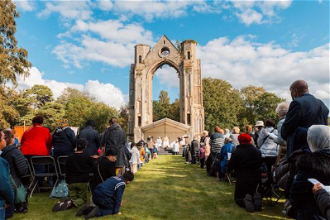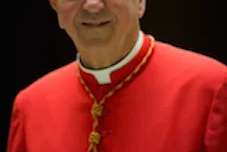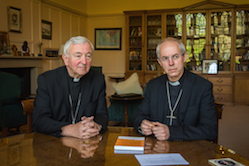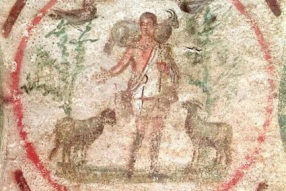Text: Archbishop Nichols praises 'prophetic vision' of first Disability Act
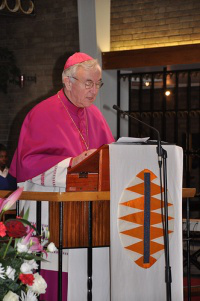
Archbishop Vincent Nichols
Archbishop Vincent Nichols gave the following address today at Holy Apostles, Pimlico, at a service marking the 40th anniversary of Chronocally Sick and Disabled Person's Act, 1970
Our Service today is a powerful recognition of the pioneering work of many people in the cause of those whose lives are marked with disabilities of various kinds or chronic sickness. Today, in particular, we think of the prophetic vision of Lord Morris who, in 1969, presented his clear and far-sighted vision of a society in which such disabilities or chronic sickness would no longer exclude people from so many of its activities and advantages. This was an immense sign of hope. Over the last forty years we have seen the achievements of this Disabilities Discrimination Act spread throughout society, with its principle aim of placing ‘needs before means’ now so widely accepted. In so many areas of society, including schools, commercial premises and churches, we have been able to witness the increasing active participation and unique contribution of people who, in the past, would not even have been present. For all of this today we thank God.
The Gospel passage proclaimed here this afternoon is echoed in these achievements. The tree of the parable can be likened to the tree of opportunity for so many: buds are in evidence; flowering can be seen; the roots of this tree are much more firmly established. But there is still plenty to be done. The challenge of increasing accessibility and
participation is there for all to see.
Yet there is a deeper challenge in this Gospel, too. It is part of the Word of God and we are told, this is a Word ‘which will never pass away.’ In other words, there is a profound link between the Word of God, made visible in Jesus Christ, and the work of inclusion which we celebrate this afternoon.
In my experience, this link is to be seen very clearly in a place such as the pilgrim shrine of Lourdes, in southern France. Many of you will know it well. It is a place of exception and of revelation.
It is a place of exception because of the way it habitually welcomes and makes space for those who live with sickness of disability. This can be experienced in so many ways. I have often entered a café in Lourdes with people, for example, confined to wheelchairs. Immediately, tables and chairs are moved away to make space for those people, who are given a welcome and not simply tolerated. Traffic on the streets is patient with their slower movement. Hotels are accommodating. They are important people.
Now this is so not only because the economic well-being of Lourdes depends on pilgrim trade. It is true for another reason, too. And this reason, ultimately, springs from our Christian faith. In this, Lourdes is also a place of revelation.
There is a truth, strongly affirmed in faith, that all people, no matter their abilities, are of equal value. That is clear. It is also clear, as a matter of conviction, that each has a contribution to make, for each if formed in the image and likeness of God and bears the mark of God’s grace. These are crucial foundations for our relationships with people of special needs.
But there is something far more profound, a far more startling revelation. Within the Christian mystery, and that is what is lived in a place like Lourdes, there is a conviction, borne out in experience, that those who are apparently weakest are those who are often most close to God. This is often so because they live, each moment of each day, a degree of
dependence on others. This experience of being dependent strips us of the illusion that we are self-made and independent individuals. This is a dangerous illusion, and yet by which so many of us fashion our lives, and, indeed, our society. The radical truth about our nature is that we are profoundly dependent on each other, and ultimately on the God who creates us out of love and draws us, for the sake of that same love, into a fullness of life which we do not easily understand. This is the mystery which so often is nearer to the grasp of those who live with disability. This is the secret heart of what they have to teach us, an able-bodied and self-willed majority which so often pushes away our radical dependence on others as no more than a sign of weakness. Yet it is out of such weakness that true and lasting human strength is ultimately built. This is the lesson of love, so often glimpsed in our own relationships. It is the lesson of love taught in its fullness in the death of Jesus who, in accepting every weakness, gives his life that we may see, learn and be transformed.
So today, as we thank God for the legislative changes that have schooled us and our society in our response to those who have special needs, let us also not lose sight of this deeper spiritual part of our nature, the spiritual values without which life is so shallow. This is the arena in which we experience love, cherish our dependence on others, come to terms with our weaknesses and so learn not only compassion for those who are in need, but deeper appreciation of the riches they have to offer us all on our real journey through life.
The ultimate tree of life for which we long is the tree of eternal life. Of course, we rejoice to see its reflection in so many aspects of human achievements. Yet we do not cease to long for its lasting fruit, born within the spiritual heart of each of us, within the spiritual communion we have with one another. That fruit finds its full maturity in the happiness of God’s presence, in heaven, which awaits us all in God’s good time.
Amen.
Source: Archbishops' House



